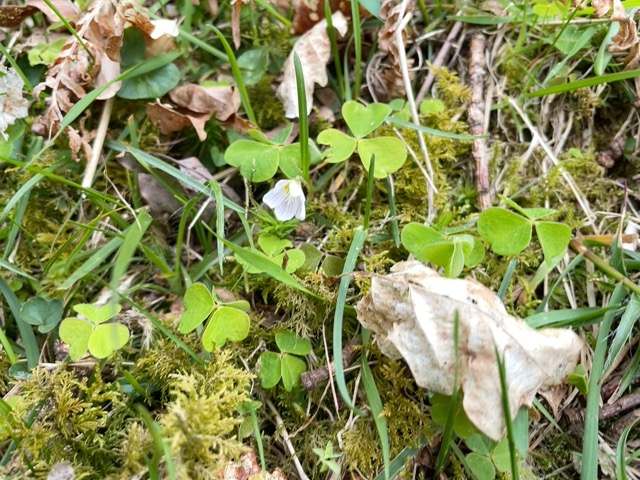Walking in woodland in Bannau Brycheiniog one day last week Fiona and I spotted a small white flower with pink veins and we paused for a few moments to identify it. A little work with an app on my smartphone led us to identify it as Wood Sorrel (Oxalis acetosella). It’s a plant whose leaves are sometimes picked by foragers for their sharp citrus taste (due to the presence of oxalic acid – which is poisonous in large quantities, but OK in small ones). It can be used to replace lemon or lime in dishes requiring a bit of ‘zing’. It has been used in herbal medicine, to curdle milk and even to remove stains from linen.
And that might have been that, except for the discovery that one of its common names is ‘Alleluia’. Why would you call this flower ‘Alleluia’? Because it typically flowers between Easter and Pentecost, when the Church includes extra responses of ‘Alleluia!’ into our worship.
It is part of the wonder of walking in the natural world, to see how creation reminds us of the Creator and how the stories and practices of faith have been woven together with the things we encounter. The idea that this plant is crying out ‘Alleluia!’ in its own way echoes Jesus’ words that even the stones around would cry out even if his followers were silent (Luke 18:39). That story from Luke’s Gospel takes place as Jesus enters Jerusalem in a royal procession – of a sort. I say ‘of a sort’ because this weekend we will see a very different royal procession with the coronation of King Charles III – one which will be full of pomp and ceremony and almost certainly lacking the donkey of Jesus’ procession. While this is undoubtedly an important, historic moment for our country, it sets me thinking about the nature of kingship that comes to us in the Bible.
Much of the Coronation liturgy reflects the Old Testament understanding of the King as anointed by God. There will be an emphasis on authority, lots of robes and jewels. It will be a rich feast for the senses, no doubt. But there is also an understanding in the Old Testament that earthly Kings (and Queens) were an accommodation to human shortcomings. Earthly kings stand in for the heavenly one, and can (indeed, do) show human frailties. (So we need to pray for them to be true and faithful to their calling and wise, just and merciful in their ruling.) The true King, however, was always God. We sense this when we talk of the kingship of Jesus. We have a very different image there. Jesus’ royal procession, on a borrowed donkey, spoke of humility, service and sacrifice not riches and power. There will be some of this in the coronation rites but it might well be overlooked partly because of the elaborate setting, but mostly because it is a difficult message for us to fully grasp. Here is true leadership, in self-sacrifice and in self-giving. It goes against the way of the world. Jesus enters Jerusalem with a statement of servanthood rather than royal pomp. Then he walks a path that leads to his own suffering and death, to save us. And it is through this that God raises him up to take his place as heavenly king.
There is a hymn that has been going through my mind in the run up to the Coronation. It was written by William Chatterton Dix, and begins:
Alleluia, sing to Jesus!
his the sceptre, his the throne;
alleluia, his the triumph,
his the victory alone.
Hark! the songs of peaceful Zion
thunder like a mighty flood:
‘Jesus, out of every nation,
hath redeemed us by his blood.’
And with that, we’re back to ‘Alleluia!’ Perhaps something to keep in mind amid the pageantry of the Coronation – that gentle ‘Alleluia!’ of the flowers that bloom reminding us of the joy of Easter and the anointing of the Holy Spirit at Pentecost. A quiet glory, reminding us of a heavenly King.







